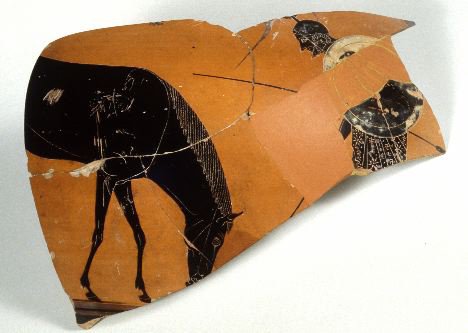The Man-Eating Horses of Diomedes
After Hercules had captured the Cretan Bull, Eurystheus sent him to get the man-eating mares of Diomedes, the king of a Thracian tribe called the Bistones, and bring them back to him in Mycenae.

Warrior approaching grazing horse
Philadelphia MS4873, fragment of an Attic black figure amphora, ca. 540 B.C.
Photograph by Maria Daniels, courtesy of the University of Pennsylvania Museum
According to Apollodorus, Hercules sailed with a band of volunteers across the Aegean to Bistonia. There he and his companions overpowered the grooms who were tending the horses, and drove them to the sea. But by the time he got there, the Bistones had realized what had happened, and they sent a band of soldiers to recapture the animals. To free himself to fight, Hercules entrusted the mares to a youth named Abderos.

Horse and groom
Tampa 86.29, Attic black figure neck amphora, ca. 490-480 B.C.
Photograph by Maria Daniels, courtesy of the Tampa Museum of Art
Unfortunately, the mares got the better of young Abderos and dragged him around until he was killed.

Fallen archer trampled by horses
Tampa 86.41, Attic black figure oinochoe, ca. 510 B.C.
Photograph by Maria Daniels, courtesy of the Tampa Museum of Art
Meanwhile Hercules fought the Bistones, killed Diomedes, and made the rest flee. In honor of the slain Abderos, Hercules founded the city of Abdera.

Abdera
Overall view of city gate from outside, from NW
Photograph by Beth McIntosh and Sebastian Heath
The hero took the mares back to Eurystheus, but Eurystheus set them free. The mares wandered around until eventually they came to Mount Olympos, the home of the gods, where they were eaten by wild beasts.
Euripides gives two different versions of the story, but both of them differ from Apollodorus's in that Hercules seems to be performing the labor alone, rather than with a band of followers. In one, Diomedes has the four horses harnessed to a chariot, and Hercules has to bring back the chariot as well as the horses. In the other, Hercules tames the horses from his own chariot:
|
He mounted on a chariot and tamed with the bit the horses of Diomedes, that greedily champed their bloody food at gory mangers with unbridled jaws, devouring with hideous joy the flesh of men.
Euripides, Hercules, 380 |
(als)
To read more about these topics, see Further Resources.
- Labor 1: The Nemean Lion
- Labor 2: The Lernean Hydra
- Labor 3: The Hind of Ceryneia
- Labor 4: The Erymanthean Boar
- Labor 5: The Augean Stables
- Labor 6: The Stymphalian Birds
- Labor 7: The Cretan Bull
- Labor 8: The Horses of Diomedes
- Labor 9: The Belt of Hippolyte
- Labor 10: Geryon's Cattle
- Labor 11: The Apples of the Hesperides
- Labor 12: Cerberus
This exhibit is a subset of materials from the Perseus Project digital library and is copyrighted. Please send us your comments.